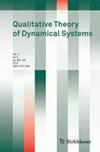非密集域上分数演化系统的近似可控性
IF 2.1
3区 数学
Q1 MATHEMATICS
引用次数: 0
摘要
本文探讨了非密集域中希尔费分数演化方程积分解的存在性和近似可控性。利用著名的广义巴拿赫收缩定理,我们建立了积分解的存在性和唯一性。此外,我们还采用了一种序列方法来推导与近似可控性相关的结果,而不依赖于半群的紧凑性或非线性函数的均匀有界性。为了验证我们的发现,我们提出并讨论了一个示例。本文章由计算机程序翻译,如有差异,请以英文原文为准。

Approximate Controllability of Fractional Evolution System on Non-Dense Domain
This article explores the existence and approximate controllability of integral solutions for Hilfer fractional evolution equations in a non-dense domain. Leveraging the well-known generalized Banach contraction theorem, we establish both the existence and uniqueness of the integral solution. Furthermore, we adopt a sequential approach to derive results related to approximate controllability, without relying on the compactness of semigroups or the uniform boundedness of nonlinear functions. To validate our findings, we present and discuss an illustrative example.
求助全文
通过发布文献求助,成功后即可免费获取论文全文。
去求助
来源期刊

Qualitative Theory of Dynamical Systems
MATHEMATICS, APPLIED-MATHEMATICS
CiteScore
2.50
自引率
14.30%
发文量
130
期刊介绍:
Qualitative Theory of Dynamical Systems (QTDS) publishes high-quality peer-reviewed research articles on the theory and applications of discrete and continuous dynamical systems. The journal addresses mathematicians as well as engineers, physicists, and other scientists who use dynamical systems as valuable research tools. The journal is not interested in numerical results, except if these illustrate theoretical results previously proved.
 求助内容:
求助内容: 应助结果提醒方式:
应助结果提醒方式:


